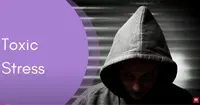Understanding the impact of Trauma
Understanding Trauma and its impact on the body, the brain, and outcomes for young people and into adulthood.
How childhood trauma affects health across a lifetime
Childhood trauma isn’t something you just get over as you grow up.
Pediatrician Nadine Burke Harris explains that the repeated stress of abuse, neglect and parents struggling with mental health or substance abuse issues has real, tangible effects on the development of the brain. This unfolds across a lifetime, to the point where those who’ve experienced high levels of trauma are at triple the risk for heart disease and lung cancer.
Pediatrician Nadine Burke Harris explains that the repeated stress of abuse, neglect and parents struggling with mental health or substance abuse issues has real, tangible effects on the development of the brain. This unfolds across a lifetime, to the point where those who’ve experienced high levels of trauma are at triple the risk for heart disease and lung cancer.

Understanding Toxic Stress
When we are threatened, our bodies prepare us to respond by increasing our heart rate, blood pressure, and stress hormones, such as cortisol. When stress response systems are activated within an environment of supportive relationships with adults, these physiological effects are buffered and brought back down. The result is the development of healthy stress response systems.
However, if the stress response is extreme and long-lasting, and buffering relationships are unavailable to the child, the result can be damaged, weakened systems and brain architecture, with lifelong repercussions.
However, if the stress response is extreme and long-lasting, and buffering relationships are unavailable to the child, the result can be damaged, weakened systems and brain architecture, with lifelong repercussions.
